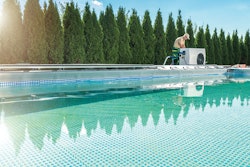
Lawmakers on both the East and West Coasts - and from both sides of the aisle - have introduced legislation that would require solar heating systems to supplement gas pool heaters.
In California, the Hybrid Swimming Pool Heating Act is AB 3023, introduced by Democratic Assemblyman Lloyd E. Levine. In New Jersey the identically named act is S764, introduced by Republican Senator Robert W. Singer. The bills are working their way through their respective legislative bodies but may soon find acceptance across the United States.
The nearly identical bills cite the shrinking supply of natural gas and the states' heavy dependence on it - along with the global warming and air pollution effects of burning fossil fuels - as the basis for the proposed legislation. Both note that swimming pool heating accounts for a significant percentage of each state's gas and propane consumption. Both bills express the desire to encourage a mainstream market for solar energy in a cost-effective way and to create jobs in a growing hybrid heating industry.
In order to receive or continue to receive gas or propane for use in heating a pool, customers will have to install solar pool heating systems with collector panels equal to 25 percent of the pool's surface area, or a system capable of providing a minimum of 25 percent of the pool's heating demand. The states propose exemptions for fuel customers in locations where it's simply not possible to install a working solar system. New Jersey's bill is ambitious; it requires that all fossil-fuel-heated pools conform within three years.
Not surprisingly, solar contractors and manufacturers seem to support the proposals. On the East Coast, Aquatherm Industries president Dave Sizelove says, "With today's rising energy costs and growing environmental concerns, heating a swimming pool exclusively with natural gas or propane is a luxury we can no longer afford."
"It's a direction we have to go," says Ted Bavin of All Valley Solar in North Hollywood, Calif., whose motto is "Saving the earth one solar system at a time." He says, "Customers should do it of their own accord, but having a push doesn't hurt. We are, as a nation and a world, in the need for rapid intervention. We're in a crisis, and people aren't moving fast enough."
Speak Solar To PowerAQUA editor Kirstin Pires discussed the genesis of the Hybrid Swimming Pool Act with New Jersey Sen. Robert W. Singer, who introduced the bill in his home state. The Republican lawmaker learned about green technologies through his involvement in planning new government and university buildings. He realized that solar pool heating - already the single largest use of solar heat in the United States - could lead the way in his state's quest to wean itself from fossil fuel."We had an excellent program that just ended in New Jersey," says Singer. "It was a 50- percent match for home conversions to solar - that was a very good incentive. The problem was that most people were doing new construction because they had to put a heating system in anyway. The retrofits are very tough. So we've had some movement in the marketplace, but it wasn't tremendously successful. This [swimming pool bill] looks to be an area that can be more successful. Once people start doing it for their pools, they can start looking at solar for other aspects of home heating. I think we have to start looking at easy conversions and things that really have quick payback and make good sense. "It's always more difficult to have legislation like this pushed in the Northeast because we don't have as much sun. And we're trying to design a bill that's workable, so here is a simple way of dealing with an energy need that can be taken care of by solar energy as opposed to natural gas use or propane. "We don't design for [efficiency]. When people build their houses they don't ask, 'Wait a second, what's the best direction, how would I place the panels, how can I do this?' We have to start thinking that way. "[The bill] sends a clear message: there is a better way. There is an environmentally sounder way of heating your pool, you don't have to expend natural gas or propane, it can be done with solar, and we're giving you time to retrofit into it. If we start to do this, like anything else, the cost of these systems goes down greatly. That's really a factor in it. There is a technology available and it can be very cost effective if we have sufficient volume. "What I find with most legislation is, you throw the idea out there and then it's going to come back. I have to presume at some point that the legislation will say, 'Well maybe for all new construction. Maybe not existing pools.' It just depends on how committed the state wants to become in changing the way we do business. It has to start somewhere. This is a painless change and there are circumstances where a person can opt out. It starts to make a clear statement that we want to think green, there's a way to conserve energy, and I think it's an important way for New Jersey to be a leader in that. "We're looking at $4 a gallon for gasoline. We have the power industry as well as the water industry in for 10, 15, 20- percent increases in our state. [Solar heating] just starts to make economic sense. And as the cost of fuel goes up, the payback happens faster. So it's the right time and the right issue." |











































